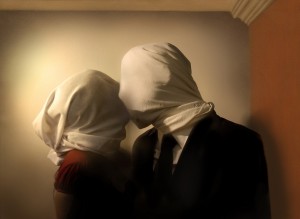
There have been a few times when I’ve felt that familiar intoxication of gazing with awe upon my lover’s face. And feeling the erratic beats of my heart as it fluttered and tried to break out of the prison-house of its walls. But one time was special. Not just because of the uncanny connection I felt with him from the start. But because it was the love that carried me to the most sublime heights of delirium and to the most unbearable crashes I’ve ever felt in my life. It was special because I stayed even after it brought me to my knees, long enough to come face to face with my darkest shadows, and to emerge through the other side of the mirror.
There has been so much hype and agitation about the madness of falling in love in films, novels and popular music. But there seems to be an inverse tendency among enlightened types to dismiss the experience of romantic love as a delusion. Prominent neuropsychiatrists have diagnosed it as a chemical imbalance in the brain. They have discovered the presence of a substance called phenylethylamine, which quickens the flow of information between nerve cells and has the effect of jolting lovers’ brains with feelings of euphoria, elation and exhilaration. It’s a kind of addictive, self-generated drug that creates infatuation junkies craving their next fix. The elated highs inevitably crash, which starts a new cycle of seeking to fall in love again as a cure for the old heartache. This addictive cycle is, supposedly, beyond conscious control; lovers are doomed to play out its drama like automatons.
Philosophers and cultural analysts have exposed romantic love as one of the dominant myths of western culture, which began with the troubadours singing of courtly love in the middle ages and continues in today’s more degenerate forms of mass culture. There is nothing natural about the drama of falling in love – the commodities of our culture brainwash people into having certain feelings and expectations of love in advance, and then fitting their individual experiences into those stereotypes. Lovers experience romantic highs as an altered state of consciousness in which everything about their beloved appears wondrous – because that’s what they’ve learned from the scripts of mass culture. But it’s all a hoax, a projection. Each lover is responding to programmed fantasies taking place in their head and not really engaging with the other person. Eventually both lovers begin to suspect that they made it all up after the honeymoon period is over and the reality of the other wrecks their most cherished illusions.
Different spiritual traditions have denounced romantic love as impure and inauthentic because it is tainted by the defilements of sexual pleasure, neediness, co-dependency, possessiveness and jealousy. The reason for all the misery and suffering of romantic love is that it’s exclusive and personal, addressed from a subject to a particular object. It is only after getting rid of the ego and its narrow-minded desires, only after there is a complete abandonment of the self, that real love – which is divine, beautiful and unconditional – can come into being. Between profane love, which expresses itself as a politics of power and domination, and spiritual love, which is unaddressed to anyone but bestowed upon the whole world without demanding anything in return, there is a precipice bridged by an abyss. This distinction runs as a common thread through the Hindu concept of prema, the Buddhist metta and the Christian notion of brotherly love, which is itself based on the ancient Greek agape. Whereas romantic love (eros) and friendship (filia) are personal and dependent on the good qualities of the other person, which makes both capricious and conditional, it is only agape, which is bestowed upon all without conditions or discrimination, that is pure and universal. And a rare and difficult thing to attain.
The discourses that seek to unmask romantic love portray it as a temporary insanity, an emotional brainwashing, a distorted hallucination, or an ego delusion arising from fear and separation. And yet so many artists and poets have depicted the ecstasies of romantic love as real, authentic, and in terms that seem very similar to spiritual love – as a pure gift that doesn’t seek anything in return, as an unconditional acceptance of the other, whatever he is (Anais Nin), as an openness to the other that is beyond judgment and criticism (Balzac). Sufi poets deliberately blur the boundary between profane and sacred love, so it’s never clear if a poem is addressed to a woman or to god. Wine, dancing, music and physical beauty are all vehicles of divine intoxication. And love is privileged as a sublime state of madness, of being so absorbed by the feeling one has for the beloved that all sense of limits and separation vanish.
Which of these depictions is true? Are there several kinds of romantic love – one selfish and possessive, and the other, an outpouring of generosity? One that makes people small and weak and another that elevates them to their highest power? Perhaps the best advice is to not accept anyone else’s story, to question everything and start from one’s own experience – because only the wisdom brought by experience is true. Not true in a universal sense of being valid for everyone, but true in the sense of something that is genuine and heart-felt, as opposed to being false, stereotypical, or an empty generalization.
The depictions of romantic love as a delusion don’t match my experience; I’ve never felt it this way, either while caught, perhaps blindly, in the moment of falling in love, or when reflecting about it after the fact. The initial high of falling in love has always felt genuine, like a sudden feeling of awe in which I was able to suspend my judgment and stop the incessant complaints that usually ran wild in my mind. It’s not so much that I was blinded to my lover’s flaws but that I saw him with altered eyes that chose to appreciate rather than criticize. And this altered perception flowed outward to the world. I felt elevated, high without intoxicants, in a kind of trance that allowed me to sense a deep connection not just with my lover but with other beings in my environment and with the rhythms of life itself. Perhaps from the point of view of a social order that defines sanity in terms of calculation, profit and getting something out of every single thing, love is a moment of madness. But it felt like a beautiful kind of madness, of becoming more real, of feeling my own greatness, of expanding beyond the limits of the habits and ideas that I had been brought up with. It was a madness in which I beheld my capacity to be joyful without reason and to be wildly generous without expecting anything back. Falling in love gave me a glimpse of the best qualities in myself, of what it felt like to be truly overflowing with my own power.
And then the crashes began. At first slowly with an innocent remark, a criticism of something I said, a distant look. Eventually they built upon each other with the speed of an avalanche. Many people speak of a honeymoon period of several months before the crashes start, but I didn’t experience any such threshold. The highs and crashes existed alongside each other, as alternating rhythmic cycles, almost from the start. The lows just became more prominent later. During the crashes I always felt like he was no longer looking at me with adoring eyes. And I became less in my own eyes. I started to doubt myself, and to doubt whether what I saw in him had been real or just a figment of my imagination. Whenever I fell back into my diminished, ordinary, everyday perception, which was full of the judgments, critiques and negativity that I had learned from my family, in the schools, and through the patchwork of society, everything about him changed, even his physical appearance. He started to look morose, ugly, as if whatever had made his face light up had vanished.
From the distance of time, I believe it was the crashes that were a kind of insane delusion – of feeling out-of-harmony with myself, alone, insufficient, conflicted, of two minds, of a thousand minds. This was a different kind of madness, the madness of falling out of love, of falling into fear and doubt, of being taken over by terrifying emotions that flared up out of nowhere, of becoming a crazy woman possessed by irrational mood swings that I never displayed around other friends or acquaintances. It was the madness of regressing to to the mind of a child, not the wondrous child that sees the world with enchanted awe, but the uncontrollable 5 year-old having a tantrum. And that kind of madness was painful, it was on the opposite end of the spectrum from feeling a sense of growth, expansion and overflowing. It was a feeling of contraction, of becoming small, powerless, cut off, unhinged. In retrospect, I realized it was the sum of all my neuroses, paralyzing fears and unconscious beliefs that I had formed during my childhood and that ran like automatic scripts in the background of all my relationships. And it was these unconscious scripts that reasserted themselves whenever the initial highs of admiration and awe began to wane. During the first moments of infatuation, what I was blinded to were my own fears and those pockets of self-loathing I had internalized, unaware, from the influences in my life. When these hidden pockets flared up unexpectedly, both of us were caught in a crazy ritual dance, reacting like automatons to whatever the other said and did.
Falling in love and feeling my heart opening up gave me a sense of something powerful in me, of my own wonder, joy, generosity and kindness. But this opening also triggered feelings of vulnerability and brought up all kinds of fears and resistances that tried to shut down the connection and feeling of expansion I felt. Eventually I realized that all the flawed qualities I saw as unbearable in my lover (to be less poetic, all those things that really pissed me off about him) were actually aspects of myself that I was trying to repress and to keep at bay. Love held up a mirror in which I was forced to look at all my fears of rejection and feelings of shame, guilt, and resentment. Everyone’s story is different, but everyone probably stumbles upon one dominant pattern, one main blindness, that is running almost everything in their lives on autopilot. Mine was the fear of criticism and rejection and the need for constant approval. The slightest criticism or judgmental remark from my lover would transport me back to the wounded 5 year-old who had been told she would never amount to anything and that nothing she did was good enough. It was the unconscious program that had shaped me into a perfectionist who could never be satisfied unless I went to the best schools, got the best grades, won the best trophies and was able to outperform everyone else. And, of course, not even then could I be satisfied…
Seeing this traumatized 5 year-old emerge at recurring intervals during our relationship was frightening. I was afraid that my lover would see all my wounds and choose not to love me anymore. Some spiritual gurus say that all these fears, insecurities and unconscious programs are not real, are not really you. But in a sense they are you, they are your wounded children, they are what have shaped your personality and created your dominant experiences in life. You cannot ignore them, wish them away, or pretend that they are not a part of you. They might not really be you, but in a more profound sense – they are against your highest aspirations, against your own good, against what is life-affirming and joyful in you, they are the unconscious parts of you that limit what you are capable of doing, that diminish your power and make you smaller. They prevent you from truly living. They are the innumerable splits you harbor within yourself that prevent you from feeling like a harmonious being. From knowing yourself, from being sovereign, from relating genuinely with other people. At least that is how I experienced coming face to face with my entire chaotic unconscious mental life. Digging it up, bringing it to light, and opening myself up to all the pain it evoked, allowed me to resolve many experiences from my past that were still affecting me without my conscious awareness. Not by fighting against them or banishing them to a dark corner, but by observing them patiently, sitting with their pain, and letting them gradually dissipate.
From the hindsight of reflection, I can say that falling in love is a kind of satori experience, a brief flash of enlightenment. And it’s not unique to love, I’ve had similar satori moments when caught in the fever of a dance, when writing something that materializes almost miraculously without my control, when gazing upon the sublimity of a sunset, when feeling inspired to perform unwarranted acts of kindness for friends, or for strangers. I’m guessing most people have experienced similar altered states of consciousness – and they are altered forms of perception, of feeling personal boundaries dissolve, of seeing the world with a kind of enchanted awe. The altered states are triggered by something external, they arrive unexpectedly, by chance, and they leave just as suddenly. They are glorious and short lived. And there’s a compulsion to repeat them because they feel so good. Many people try to repeat the initial highs of falling in love by leaping from relationship to relationship, just as others might chase their next LSD, peyote or ayahuasca trip. The state of expanded awareness is intoxicating. But for me, living consciously is not about chasing the temporary highs of altered mental states. It’s about developing the will and training myself to be able to produce those states out of my own power. This is what Spinoza called creating joy actively rather than meeting it on the wings of circumstance.
This is not an echo of today’s law of attraction industry, which preaches that the only thing that counts is feeling good, that when you feel good you manifest magical things in your life, and that your aim should be to banish all negative emotions and thoughts, to simply pivot your attention whenever you feel any deep hurt or uncomfortable feeling rising up in you by immediately thinking of something else – of puppies, children, your first crush, or whatever else works to get you out of your negative state. I think this kind of prescription is based on a misunderstanding. By trying to ignore or repress your pain, it is pushed further down into unconsciousness and it becomes more prone to flare up uncontrollably at unexpected moments. It is not pain and negative emotions that are problematic but their suppression, whether by running away to another location, or to another person who can make you feel better, or to another happy thought. Whatever is not fully expressed and felt by the body remains trapped somewhere. It gets hidden in the interstices of the cellular memory, it hardens the muscles, bends the bones, constricts the breath. It’s because we’re not allowed to experience painful emotions as children, because parents and educators tell us that they’re unacceptable, that they get pushed down into the body and give rise to all kinds of physical illnesses and psychological disturbances. This muscular armor, as Wilhelm Reich called it, is initially formed as a protective barrier to insulate us from an even more overwhelming pain. But in time this armor grows, stiffens, and prevents us from truly living, from feeling the body, from moving freely, from experiencing pleasure.
For me creating joy actively also means acknowledging my pain, observing where it is felt in the body, uncovering where in my past it originated, and seeing how it has (mis)shaped me. This is not the same as wallowing in suffering or letting the mind wander away with long-winded stories about resentments and grievances, but simply letting myself feel the sensation or emotion passing through the body quickly, unrestricted. If I can see these moments of pain from a different perspective – namely, that they’re releasing something that has been blocked or that they’re meant to teach me something about myself and to help me expand – then I can feel a kind of elation when they happen. Joy doesn’t mean constantly thinking happy thoughts and chasing happy experiences, which would be an impossible task. It can co-exist with both pleasurable and painful experiences. It means not being overwhelmed by sensations and emotions but allowing them to be felt and being grateful that even the most painful experiences have something precious to teach. To create joy actively is to be free from the tyranny of the past (from our unconscious conditioning), from the bondage of the present (from circumstances beyond our control kidnapping our thoughts and emotions), and from the turmoil of the future (from worries and plans that prevent us from enjoying the magic and fulness of what is happening in the moment).
In the past I’ve always experienced the madness of falling in love as a fall. I stumbled, tripped, was caught unaware, was kidnapped by my emotions. This first madness – in which my conditioned behaviors, judgments and fears were temporarily suspended – was an act of chance. Or grace. Or chemicals dancing in the brain. Or the fairies of the universe weaving their secret magic – whatever you choose to call it. But it felt real, it was profound, and it showed me what I was capable of in my best moments. In the past I’ve always experienced the madness of falling out of love as a fall. I stumbled, tripped, was caught unaware, was kidnapped by my emotions. The real test of love came after the magic spell vanished, after the second fall, when I was brought face to face with my deepest pains and fears. It’s only after the magic spell ends that conscious love can begin. And then it’s no longer a fall, but something that rises. By learning how to create my own intoxicated wonder and awe, love has became a conscious experience rather than an accident of fate. The first high of falling in love might have been a bit of nature’s magic. The second magic was my own…











